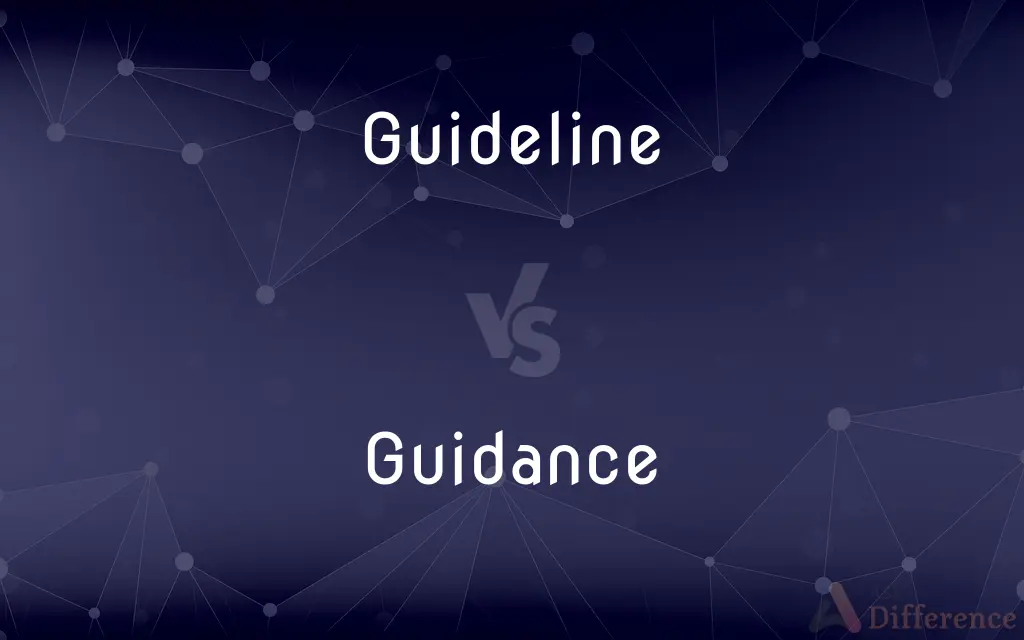Guideline vs. Guidance — What's the Difference?
By Tayyaba Rehman — Updated on October 11, 2023
A guideline is a set of recommendations or rules to follow. Guidance refers to advice or direction provided. While guidelines are more specific, guidance offers general direction.

Difference Between Guideline and Guidance
Table of Contents
ADVERTISEMENT
Key Differences
A guideline often represents a framework or set of specific rules and recommendations that aim to standardize a process or behavior. Many organizations implement guidelines to ensure consistency and efficiency. For example, medical guidelines might offer specific protocols for treating certain conditions. In contrast, guidance is a more general term, referring to advice, direction, or counsel given to navigate a situation or decision-making process. It may not be as prescriptive as a guideline.
Guideline, by its nature, is typically more structured. It may come in the form of a document, a checklist, or a set of steps to be followed in particular sequences. Such structures enable entities to adhere to best practices or regulatory standards. Guidance, on the other hand, tends to be more fluid, offering suggestions or insights based on experience or knowledge. It's a softer approach to directing behavior or decisions.
When considering the source, guidelines are often produced by governing bodies, institutions, or expert committees. They are drawn from research, evidence, or consensus and aim to establish a benchmark or standard. Guidance, however, can come from anyone with experience or expertise in a particular area. A mentor offering insights or a friend giving advice on a personal matter both fall under the umbrella of guidance.
In some contexts, guidelines can be mandatory, with consequences for non-compliance. They may be tied to legal or regulatory requirements. Guidance, however, is usually optional. It's an offering of wisdom or perspective that one can choose to follow or disregard. While a guideline says, "This is the way you should do it," guidance might suggest, "This might be a good way to approach it."
Lastly, the purpose of a guideline is to standardize, ensure safety, and promote best practices. It seeks uniformity and clarity. Guidance, conversely, aims to support, advise, and provide direction, often tailored to individual needs or circumstances.
ADVERTISEMENT
Comparison Chart
Definition
A set of specific rules or recommendations.
Advice or direction provided.
Nature
Structured and often prescriptive.
More fluid and general.
Source
Typically from governing bodies, institutions, or expert committees.
Can come from anyone with experience or expertise.
Compliance
Can be mandatory with consequences for non-compliance.
Usually optional.
Purpose
To standardize, ensure safety, and promote best practices.
To support, advise, and provide direction tailored to the situation.
Compare with Definitions
Guideline
A structured document outlining best practices.
The health department released a new guideline for treating the virus.
Guidance
Advice or direction provided to navigate a situation.
She sought guidance from her mentor regarding career choices.
Guideline
A benchmark or standard for behavior or action.
The environmental guideline demands a significant reduction in emissions.
Guidance
Assistance in decision-making or problem-solving.
The team needed guidance on executing the project efficiently.
Guideline
A tool for ensuring consistency and uniformity.
The editorial team follows a strict guideline for content creation.
Guidance
The act or process of guiding.
Guideline
A guideline is a statement by which to determine a course of action. A guideline aims to streamline particular processes according to a set routine or sound practice.
Guidance
Counseling, such as that provided for students seeking advice about vocational and educational matters.
Guideline
A statement or other indication of policy or procedure by which to determine a course of action
Guidelines for the completion of tax returns.
Guidance
Any of various processes for guiding the path of a vehicle or missile, by means of built-in equipment.
Guideline
A non-specific rule or principle that provides direction to action or behaviour.
He considered the Ten Commandments more as a guideline than a requirement.
Guidance
A document providing official guidelines for implementing a policy
A new guidance regarding nondiscriminatory hiring practices.
Guideline
A plan or explanation to guide one in setting standards or determining a course of action.
Guidance
The act or process of guiding.
Guideline
A light line, used in lettering, to help align the text.
Guidance
Advice or counselling on some topic.
Divine guidance
Guideline
A formal rule describing how a situation must be handled; - used as a direction to administrators from superiors.
Guidance
Any process or system to control the path of a vehicle, missile etc.
Guideline
A light line that is used in lettering to help align the letters
Guidance
The act or result of guiding; the superintendence or assistance of a guide; direction; government; a leading.
His studies were without guidance and without plan.
Guideline
A detailed plan or explanation to guide you in setting standards or determining a course of action;
The president said he had a road map for normalizing relations with Vietnam
Guidance
Something that provides direction or advice as to a decision or course of action
Guideline
A rule or principle that provides guidance to appropriate behavior
Guidance
The act of guiding or showing the way
Guideline
A set of recommendations or protocols to follow.
The company provided a guideline on remote work policies.
Guidance
The act of setting and holding a course;
A new council was installed under the direction of the king
Guideline
Rules established by authority or expertise.
The safety guidelines at the construction site are strict and mandatory.
Guidance
Counsel based on knowledge or experience.
The therapist offered guidance on managing stress.
Guidance
Direction given to achieve a particular outcome.
With proper guidance, he improved his skills considerably.
Guidance
Support or mentorship offered to someone.
New employees receive guidance during their initial weeks.
Common Curiosities
Are guidelines always mandatory?
No, while some guidelines can be mandatory, especially in regulatory contexts, others are simply best practice recommendations.
What is a Guideline?
A guideline is a set of specific rules or recommendations to follow, often established by an authority or expert body.
Can anyone offer Guidance?
Yes, guidance can be provided by anyone with experience, knowledge, or expertise in a particular area.
How are guidelines typically presented?
Guidelines are often structured, coming in the form of documents, checklists, or step-by-step protocols.
How does Guidance differ from a Guideline?
While a guideline offers specific rules or recommendations, guidance provides general advice or direction.
Is seeking Guidance always about problems?
No, guidance can be sought for enhancement, growth, or simply to gain a fresh perspective on a matter.
Can a guideline evolve over time?
Absolutely, as new information or research emerges, guidelines can be updated or changed.
Is there a legal binding to guidelines?
Some guidelines, especially in regulatory or safety contexts, may have legal implications, but not all are legally binding.
What’s the primary purpose of Guidance?
The main aim of guidance is to advise, support, and provide direction, tailored to individual needs or situations.
Who typically establishes guidelines?
Guidelines are often established by governing bodies, institutions, expert committees, or authorities in a specific field.
Can guidance be formal?
While guidance is generally more informal than guidelines, it can be formalized in certain contexts, such as professional mentorship programs.
Why might someone seek Guidance?
Individuals might seek guidance for clarity, support, decision-making, or to benefit from another's experience and perspective.
Do all organizations have guidelines?
Most organizations establish guidelines to ensure consistency, safety, and best practices, but the specifics can vary widely.
Are guidelines only for professional contexts?
No, guidelines can exist in various contexts, from professional to personal, like dietary guidelines or household rules.
Can Guidance be found in written form?
Yes, while guidance is often verbal, it can also be found in written forms like books, articles, or advisory documents.
Share Your Discovery

Previous Comparison
Belt vs. Sash
Next Comparison
Glass vs. PorcelainAuthor Spotlight
Written by
Tayyaba RehmanTayyaba Rehman is a distinguished writer, currently serving as a primary contributor to askdifference.com. As a researcher in semantics and etymology, Tayyaba's passion for the complexity of languages and their distinctions has found a perfect home on the platform. Tayyaba delves into the intricacies of language, distinguishing between commonly confused words and phrases, thereby providing clarity for readers worldwide.














































